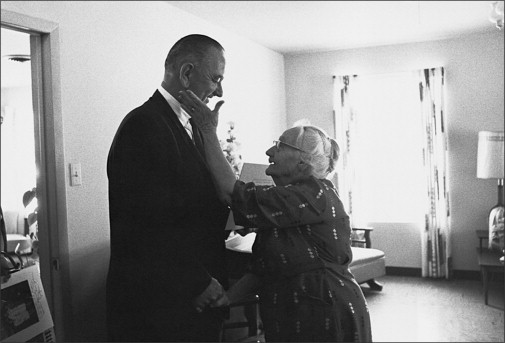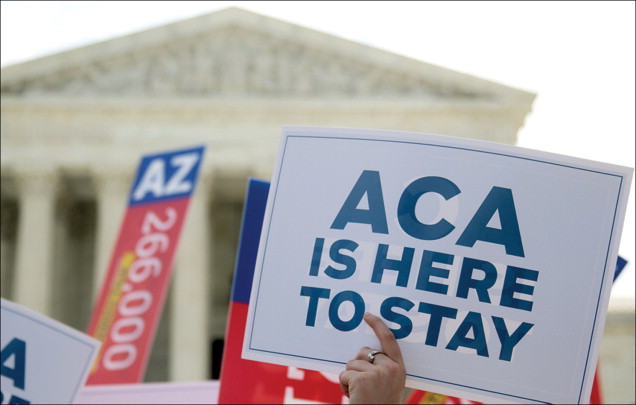50 Years of Medicare
 Volume 386, Issue 9992, 1 August 2015
Volume 386, Issue 9992, 1 August 2015
WORLD REPORT In July, 1965, Medicare, America’s landmark national health insurance programme, became law. Today, it covers 55 million people. Susan Jaffe, The Lancet’s Washington correspondent, reports.
Richard Troeh joined a very busy solo family medicine practice in 1966 but even with two doctors, their offi ce in Independence, Missouri, seemed just as hectic. The year before, President Lyndon Baines Johnson came to town to sign the Medicare legislation into law at the Truman library. Former President Harry Truman—an advocate of national health insurance since the 1940s—and his wife attended the event and were among the fi rst Americans to receive Medicare cards.
50 years later, the Social Security Amendments of 1965 provide health care for 55 million people older than 65 years or disabled receiving Medicare and nearly 73 million low-income adults, children, pregnant women, and people with disabilities receiving Medicaid, an optional programme also created under the same law.
And in the process, the government programmes have transformed health care in the USA. Medicare is the nation’s largest single purchaser of health care, consuming 14% of last year’s federal budget, or US$505 billion. And it also has a fiercely loyal following that opposes efforts to cut benefits. Speaking earlier this month at the White House Conference on Aging, President Barack Obama drew laughs when he said, “And now we’ve got [protest] signs saying, “Get your government hands off of my Medicare”. [Continued in full text or PDF ] [listen to podcast here]
Congress Overwhelmingly Approves Bill Bolstering Medicare Patients’ Hospital Rights
By Susan Jaffe | Kaiser Health News | July 29, 2015 | This KHN story also ran in 
The U.S. Senate unanimously approved legislation Monday night requiring hospitals across the nation to tell Medicare patients when they receive observation care but have not been admitted to the hospital. It’s a distinction that’s easy to miss until patients are hit with big medical bills after a short stay.
miss until patients are hit with big medical bills after a short stay.
The vote follows overwhelming approval in the U. S. House of Representatives in March. The legislation is expected to be signed into law by President Barack Obama, said its House sponsor, Texas Democratic Rep. Lloyd Doggett.
It’s called the NOTICE Act, short for “Notice of Observation Treatment and Implication for Care Eligibility.” The law would require hospitals to provide written notification to patients 24 hours after receiving observation care, explaining that they have not been admitted to the hospital, the reasons why, and the potential financial implications.
Those implications can be dire. Observation care hurts seniors in two ways: It keeps Medicare’s more comprehensive hospitalization coverage from kicking in, and it means they may not get Medicare’s limited nursing home benefit if they need care in a facility after being in a hospital.
To qualify for Medicare’s nursing home coverage, beneficiaries must first spend three consecutive midnights as an admitted patient in a hospital, and observation days don’t count. Without that coverage, seniors could pay thousands of dollars for the nursing home care their doctor ordered, or else try to recover on their own. Observation care is a classification used when patients are not well enough to go home but not sick enough to be admitted. [Continued in Kaiser Health News]
New Regulations Would Require Modernizing Nursing Home Care
By Susan Jaffe | July 13, 2015 | Kaiser Health News in collaboration with ![]()
After nearly 30 years, the Obama administration wants to modernize the rules nursing homes must follow to qualify for Medicare and Medicaid payments.
The hundreds of pages of proposed changes cover everything from meal times to use of  antipsychotic drugs to staffing. Some are required by the Affordable Care Act and other recent federal laws, as well as the president’s executive order directing agencies to simplify regulations and minimize the costs of compliance.
antipsychotic drugs to staffing. Some are required by the Affordable Care Act and other recent federal laws, as well as the president’s executive order directing agencies to simplify regulations and minimize the costs of compliance.
“Today’s measures set high standards for quality and safety in nursing homes and long-term care facilities,” said Health and Human Services Secretary Sylvia M. Burwell. “When a family makes the decision for a loved one to be placed in a nursing home or long-term care facility, they need to know that their loved one’s health and safety are priorities.”
in a nursing home or long-term care facility, they need to know that their loved one’s health and safety are priorities.”
Officials announced the update as the White House Conference on Aging convenes Monday. The once-a-decade conclave sets the agenda for meeting the diverse needs of older Americans, including long-term care options. This month also marks the 50th anniversary of the Medicare and Medicaid programs, which cover almost 125 million older, disabled or low-income Americans. Medicare and Medicaid beneficiaries make up the majority of residents in the country’s more than 15,000 long-term care facilities. [MORE from Kaiser Health News and NPR]
Want a good laugh? Head to the hospital.
By Susan Jaffe KAISER HEALTH NEWS | July 7, 2015 | This KHN story also ran in 
Every month, a group of older adults goes to Washington’s Sibley Memorial Hospital, but they don’t see a doctor or get tests. They’re not sick. They come just for laughs.

Joanne Philleo, 79, enjoys a joke at the monthly “Laugh Cafe” event at Sibley Memorial Hospital. (Amanda Voisard for The Washington Post)
They gather in a room next to the hospital cafeteria for the “Laugh Cafe,” one of the activities offered to local seniors, including the 7,300 members of Sibley’s Senior Association. The price of admission is one joke, recited out loud. Experts say laughing can be good for your health, and everyone in the room strongly agrees.
…The association for those age 50 or older also offers other activities, including French and Italian conversation classes, day trips to museums, a current events group, and — the latest addition — tango lessons. In addition, members receive discounts on hospital parking and at the gift shop, pharmacy and restaurant. In all, more than 10,000 seniors participate.
Sibley is one of several hospitals in the Washington area — along with others across the country — offering social activities and other benefits to help seniors stay healthy and out of the hospital, while encouraging them to visit. Participants do not need to have been patients.
But some experts are concerned that the activities are less about health than about marketing to Medicare beneficiaries, especially those who can go to the hospital of their choice when they need care because they are not enrolled in private insurance plans with limited provider networks.[Continued in Washington Post]
US Supreme Court upholds ACA subsidies
Volume 385, Issue 9988, 4 July 2015
WORLD REPORT Officials expect to launch the US President’s new health project later this year. But Congress has yet to decide whether to fully fund it. The Lancet’s Washington correspondent, Susan Jaffe, reports.
Although critics still deride it as Obamacare, President Barack Obama’s Supreme Court victory last week
enshrined the Affordable Care Act (ACA) as one of his greatest domestic accomplishments. The court might have also effectively disarmed the opposition, shifting the debate to next year’s campaign for the presidency as the next chance for critics to try to dismantle the law.
But for 6·4 million Americans who could have lost the health law’s insurance subsidies—the key issue before the court—the historic ruling has a different meaning. “Thank God, I can still get my medical care”, said Jacqueline Clay, a New Jersey woman receiving treatment for breast cancer who turned 61 years of age the day the court upheld the subsidies. “I am not going to die.” [Continued in full text or PDF ]
When Turning 65, Consumers With Marketplace Plans Need To Be Vigilant In Choosing Health Coverage
By Susan Jaffe | June 25, 2015 | Kaiser Health News
Befor e the Affordable Care Act, older adults who couldn’t afford to buy their own health insurance would count the days until their 65th birthday, when Medicare would kick in. Now, 10,000 Americans hit that milestone every day, but for some who have coverage through the ACA’s insurance marketplaces, Medicare may not be the obvious next step.
e the Affordable Care Act, older adults who couldn’t afford to buy their own health insurance would count the days until their 65th birthday, when Medicare would kick in. Now, 10,000 Americans hit that milestone every day, but for some who have coverage through the ACA’s insurance marketplaces, Medicare may not be the obvious next step.
“Consumers eligible for Medicare can keep or renew their marketplace plan,” said Medicare spokesman Alper Ozinal, as long as they don’t also join Medicare. [Continued in Kaiser Health News]
Planning for US Precision Medicine Initiative underway
Volume 385, Issue 9986, 20 June 2015
WORLD REPORT Officials expect to launch the US President’s new health project later this year. But Congress has yet to decide whether to fully fund it. The Lancet’s Washington correspondent, Susan Jaffe, reports.
While continuing to defend his besieged health-care reform law against lawsuits and repeal threats, US President Barack Obama is championing a new health initiative. This one also has a bold goal: to radically change the medical treatment patients receive in the USA. “I want the country that eliminated polio and mapped the human genome to lead a new era of medicine—one that delivers the right treatment at the right time”, the President said when he unveiled his Precision Medicine Initiative (PMI) in his annual State of the Union address to the nation in January. …Central to the PMI will be the creation of a research cohort of 1 million US volunteers who agree to provide researchers with biological, environmental, lifestyle, and other information as well as tissue samples….The effort to vastly expand the scope and practice of individually designed treatments based on genetic information could revolutionise medicine, supporters say. But the success of the PMI depends on whether Congress agrees to fund it. [Continued in full text or PDF ]
Obamacare, Private Medicare Plans Must Keep Updated Doctor Directories In 2016
By Susan Jaffe | March 9, 2015 | Kaiser Health News and also published in 
Starting next year, the federal government will require health insurers to give millions of Americans enrolled in Medicare Advantage plans or in policies sold in the federally run health exchange up-to-date details about which doctors are in their plans  and taking new patients.
and taking new patients.
Medicare Advantage plans and most exchange plans restrict coverage to a network of doctors, hospitals and other health care providers that can change during the year. Networks can also vary among plans offered by the same insurer. So it’s not always easy to figure out who’s in and who’s out, and many consumers have complained that their health coverage doesn’t amount to much if they can’t find doctors who accept their insurance. [More from KHN] [More in USA Today]
21st Century Cures Act progresses through US Congress
![]() Volume 385, Issue 9983, 30 May 2015
Volume 385, Issue 9983, 30 May 2015
WORLD REPORT A bill to speed up the translation of biomedical discoveries is getting wide support, but some argue that it is not adequately funded. Susan Jaffe, The Lancet’s Washington correspondent, reports.
An ambitious bipartisan plan to accelerate medical innovation in the USA is moving ahead in a Congress famous for political gridlock.
The proposed 21st Century Cures Act was approved unanimously on May 21 by the US House of Representatives’ Committee on Energy and Commerce. The massive bill would promote discovery of new medicines and get them to patients more quickly. But the bill’s bipartisan support nearly collapsed when Democrats insisted on additional funds for the two federal agencies intricately involved in carrying out the bill’s far-reaching provisions.
Behind-the-scenes discussions finally yielded an infusion of US$10 billion over 5 years for the National Institutes of Health (NIH). Shortly before the committee vote, $550 million over 5 years was added for the Food and Drug Administration (FDA), which is responsible for ensuring new treatments are safe and effective. …But funding for both agencies did not come easy, is still uncertain, and might fall far short of what is needed. [Continued full text or PDF]
Officials Weigh Options To Hold Down Medicare Costs For Hospice
By Susan Jaffe | April 23, 2015 | Kaiser Health News and also published in 
Medicare officials are considering changes in the hospice benefit to stop the federal government from paying twice for care given to dying patients. But patient advocates and hospice providers fear a new policy could make the often difficult decision to move into hospice care even tougher.
Patients are eligible for hospice care when doctors determine they have no more than six months to live. They agree to forgo curative treatment for their terminal illness and instead receive palliative or comfort care. However, they are also still allowed Medicare coverage for health problems not related to their terminal illness, including chronic health conditions or for accidental injuries.
Medicare pays a set amount to the hospice provider for all treatment and services related to the terminal illness, including doctor’s visits, nursing home stays, hospitalization, medical equipment and drugs. If a patient needs treatment that hospice doesn’t provide because it is not related to the terminal illness — or the patient seeks care outside of hospice — Medicare pays the non-hospice providers. The problem is that sometimes Medicare pays for care outside the hospice benefit that it already paid hospice to cover.
To reduce the chances of these duplicative payments, Medicare officials have announced that they are examining whether to assume “virtually all” the care hospice patients receive should be covered under the hospice benefit….
Seniors’ advocates are worried that putting all coverage under the hospice benefit will create obstacles for patients. Instead, Medicare should go after hospice providers who are shifting costs to other providers that Medicare expects hospice to cover, said Terry Berthelot, a senior attorney at the Center for Medicare Advocacy, who urged the government to protect hospice patients’ access to non-hospice care….”If your blood sugar gets out of control, that could hasten your death,” she said. “But people shouldn’t be rushed off to die because they’ve elected the hospice benefit.” [More from KHN] [More in USA Today]
Obama steps up US campaign on climate change
![]() Volume 385, No. 9978 25 April 2015
Volume 385, No. 9978 25 April 2015
WORLD REPORT In recent weeks, the Obama Administration has unveiled several new initiatives to tackle climate change. The Lancet’s Washington correspondent, Susan Jaffe reports.
Surgeon General Dr. Vivek Murthy and President Barack Obama
With less than half of his final term in the White House remaining, US President Barack Obama is no longer confining his efforts to slow climate change to Congress or the courts, where opponents are trying to block new, tougher environmental rules at every turn.
In the past 3 weeks, his Administration has announced a multifaceted public appeal, including plans to expand public access to tracking the impact of climate change with help from such private sector giants as Google and Microsoft, create a coalition of 30 medical, nursing, and public schools to train health-care providers to respond to the health effects of climate change, and host a climate change and health summit at the White House in the spring….
Last month, the Obama Administration submitted a US climate plan to the UN Framework Convention on Climate Change in preparation for December’s global conference in Paris. But the US pledge to reduce greenhouse gases depends in a large part on power plants reducing their carbon dioxide pollution; the US Environmental Protection Agency (EPA) is expected to finalise limits for power plants this summer. Even before they take effect, 14 states and two coal companies have taken the unusual step of challenging the agency’s still uncompleted rules in federal court.
The President is also making the fight personal, recalling, during an interview on national television, that when his eldest daughter was 4 years old, she had such a severe asthma attack that her parents had to take her to the hospital for emergency treatment. “The fright you feel is terrible”, he said.
Obama warned of increased asthma cases and “a whole host of public health impacts that are going to hit home”, speaking after meeting with the medical and nursing schools coalition. [Continued: full text or PDF ]
US initiative for prediabetes
IN FOCUS Health officials in the USA want physicians to help to reduce diabetes by asking at-risk patients to join diabetes prevention programmes. Susan Jaffe reports from Washington, DC.
“…Clinicians may be talking to patients about their elevated blood sugar, but if it isn’t diabetes, some do not take it very seriously”, Ann Albright, director of the CDC’s Division of Diabetes Translation, told The Lancet Diabetes & Endocrinology. “But the evidence is clear that the earlier you intervene, the greater the likelihood is of either preventing or delaying diabetes or, if someone already has diabetes, preventing or delaying the complications.” [Continued: PDF ]
Republicans’ bills target science at US environment agency
![]() Volume 385, Issue 9974, 28 March 2015
Volume 385, Issue 9974, 28 March 2015
WORLD REPORT Proposed legislation would change how the US Environmental Protection Agency uses science to determine pollution limits. The Lancet‘s Washington correspondent Susan Jaffe reports.
Approval of two controversial environmental bills in the US House of Representatives last week was the latest assault in the Republicans’ “war on science”, according to Democrats. Republicans, however, considered it a big step towards assuring that federal environmental regulations are based on solid scientific research. Despite the sharp difference of opinion along political lines, both sides claim to pursue similar goals—to keep the agency responsible for protecting the nation’s health and environment impartial and closely guided by the best science.
…The Secret Science Reform Act of 2015 would prohibit the US Environmental Protection Agency (EPA) from proposing or finalising any policy “unless all scientific and technical information” officials relied on is “the best available science” and is “publicly available online in a manner that is sufficient for independent analysis and substantial reproduction of research results”.
“The days of ‘trust me’ science are over”, the bill’s lead sponsor, Texas Republican Lamar Smith, told The Lancet. “The American people deserve to see the data.” [Continued: full text or PDF ]
Robert Califf: leading cardiologist is new FDA Deputy

Volume 385, Issue 9970
28 February 2015
As the new Deputy Commissioner for Medical Products and Tobacco at the US Food and Drug Administration (FDA), world-renowned cardiologist Robert Califf arrives at a time when the FDA’s overall responsibilities have grown exponentially. The Lancet‘s Washington correspondent, Susan Jaffe, reports. [article continued as full text or PDF] [Podcast with Dr. Califf here.]


